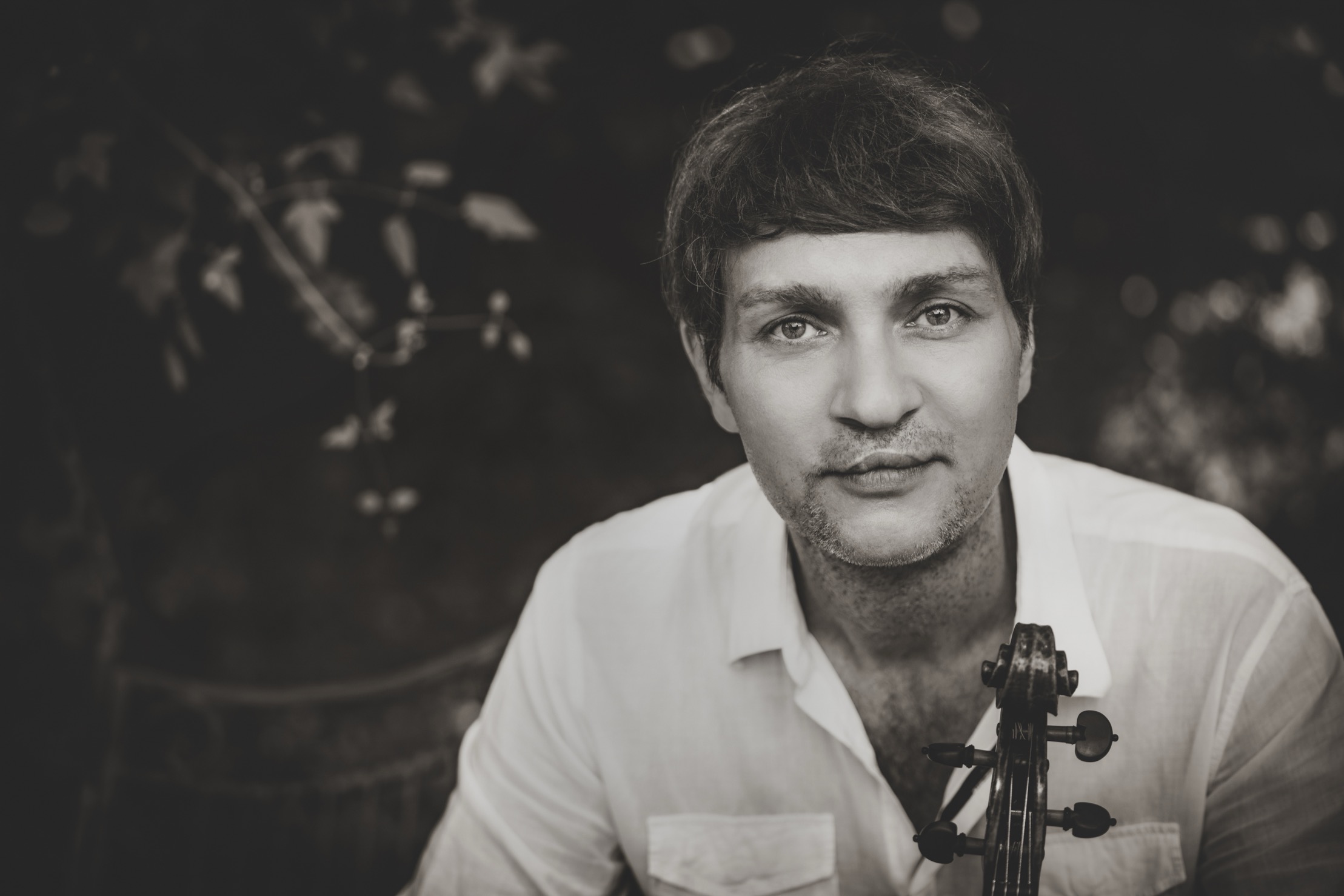»Music is the glue that holds our society together«
Nils Mönkemeyer enjoys international acclaim in the world of classical music. Away from the top concert platforms and the award-winning recordings for the SONY label, however, the violist comes across as a modest, gentle, deeply reflective artist who clearly does not seek adulation.
By Dorothe Gschnaidner
This conversation took place in February 2025.
It was first printed in Rotary Magazine April 2025.

Perhaps the viola, with its earthy sound, warm curves and dark, velvety fullness, is a particularly apt conduit between heaven and earth – and this can be felt in Mönkemeyer’s concerts. His listeners find themselves sunken in a bed of green moss, soft and springy yet robust, and strewn with glittering stardust. Audiences and critics alike are enchanted by his colourfulness, fascinated by the spirit and intensity of his playing.
It is not only in extrovert solo performance that Mönkemeyer’s true vocation as a violist is shown. While he enjoys navigating solo concertos with an orchestra, he also appreciates the challenge of journeying together with others through a piece of chamber music, discovering and awakening it, even if it means relinquishing part of the decision-making, as he adds thoughtfully.
Companionship and guidance are his foremost priorities as a teacher. In 2025 he was the first professor at a German university of music to be named »University Teacher of the Year«, chosen out of 584 universities and colleges by the German University Association (DHV). Previously, this honour had primarily been reserved for doctors and scientists. The selection criteria of the DHV include excellence, but place even more importance on exemplary social commitment.
Having been inspired as a student by Yehudi Menuhin’s »Live Music Now« initiative, Mönkemeyer is now committed to making concerts available to those parts of society currently excluded from classical music’s elitist and expensive ‘ivory tower’. He feels that urgent action is needed to sweep aside stereotypes. It was appropriate that the DHV award ceremony took place in his newly chosen hometown of Berlin.
He took up the viola professorship at Berlin’s Hanns Eisler School of Music, following tenures in Madrid, Dresden and Munich. It comes as no surprise that his Munich viola class has followed him to Berlin.
Although he is considered strict – a fact that brings a smile to his face – his teaching is never confrontational. Instead it is focused on exploration and development, always orientated around the personality of each student. »My standards are high, I’m happy to admit that. But if a pupil can’t do something, that’s down to me. Then I have to find a way to solve the problem, for them and with them.« Mönkemeyer’s convictions are clear, and he doesn’t beat about the bush. He considers himself to be a no-frills musician who has landed on his feet, and his gratitude for this is sincere and deep. The way he sees it, each person’s task in life is to realise their own potential. This belief is very significant to him, and he encourages his students in the same direction.
The classical music world is not a sector that can complain of a skills shortage. In fact, German universities of music and conservatoires can hardly keep up with student numbers. They have the privilege of being able to offer a high quality, tailor-made education without tuition fees. »Who knows how long we will be able to maintain this luxury? If you want to study at the famous Julliard School in the USA, for example, you might have to take on years, even decades, of debt.« Mönkemeyer does, however, criticise the quality of pre-tertiary musical education in Germany. Entrance auditions unfortunately reveal glaring deficits on this front, and the many foreign applicants are often vastly superior.
Mönkemeyer is a realist. He knows the rigours of the classical music market, which, behind the scenes, demands iron discipline from its celebrated performers, not to mention a certain stoicism when there is no time for friends, or the train arrives late and they have to dash straight from the station to the stage. Building a career has never been his main motivation. It was during the coronavirus pandemic that he realised how much he missed the inspiration of live music and audience contact. »Suddenly, that feeling of experiencing something for and with other people just disappeared completely.« Interaction with the audience is essential to him. »That’s the driving force behind my decision to be a musician.« That indescribable moment when the air crackles and sparks fly can only happen in a concert hall. »If we cut back on culture now, the halls will fall quiet. Without that elusive magic that connects artist and audience, our future looks bleak.«
Moving to the vibrant metropolis of Berlin – heralding a new chapter in his life – was a conscious decision on his part. He is well aware that culture budgets there are being slashed.
An exciting collaboration is already in the offing. Mönkemeyer’s motto is »We can achieve more together than we can alone«, and this attitude is certainly one of his guiding lights. He is driven by the desire to foster community. He launched his Berlin university programme with the »Musethica« initiative, in which teachers and their students develop concert formats together, with the most talented playing for people with disabilities, the homeless, refugees and prisoners.
»I sense very strongly that divisions exist, and that people prefer to retreat into their own bubble. There is a noticeable and growing dissatisfaction, and a lot of people don’t feel heard. This lack of communication and community can be overcome through the unifying medium of music.«
Nils Mönkemeyer is a passionate advocate of culture. He recognises that companionship and emotion are the glue that holds our society together, and this is where he sees the immense potential of his profession: music.
